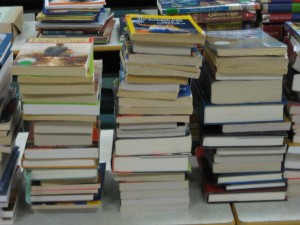This week I randomly picked up an Educational Leadership magazine with the headline “Teaching Screenagers†so I could quickly pick up a few technology ideas to think over. One article that discussed reading complex texts and technology particularly caught my eye. The title of this article is “Too Dumb for Complex Texts?â€, and it explores whether this technological age has resulted in students who do not have the capacity or the willingness to comprehend complex texts that are presented to them in university.
The article initially intrigued me because I had been reading so much about how technology is the wave of the future, and I was starting to feel like if I did not grasp onto this new medium for my classroom fairly quickly it would leave me behind. I do agree with a few of the points mentioned in the article. For example, the author states that electronic communications require a quick response, which is the antithesis to the slow, receptive reading that is necessary for complex writing. Students brought up in the Internet age become active contributors to ideas, because a quick comment on a blog post is often all that is required to become embroiled in an ideological debate. However, this doesn’t work for slow reading, where the reader must take in the entirety of the writing through laboured and conscious thought, and be able to summarize the ideas as well as give his initial opinion. Based on what I’ve seen online, I could say that this analysis is true. I’ve often felt that the Internet fosters a certain quickness, and if you do not comment immediately on an idea you will be left behind. Also, when I read this article a second time I read it online, and I found myself more likely to use the page down button to scan for main ideas rather than look at each sentence. That may have been only because I was re-reading something that I had already gathered information on, but it does pose an interesting question about whether the Internet naturally leads us to scan and not think deeply when looking at printed documents.
However, I also don’t think that technology is completely to blame in this issue. If I remember my own university experience properly, there has often been a struggle for first-year students to understand complex texts, and doing well in secondary school only to then do poorly in university is not a new phenomenon. Instead of believing that technology and complex texts are equals in terms of literacy, perhaps technology should play a supporting role in understanding difficult writing. Literacy strategies, verbal discussion, Socratic seminars, and other good parts of our teacher training should also be presented to the students. Don’t let all assignments take the form of blog posts and videos, but also don’t naturally assume that banning Internet research for a project will yield more methodical readers. As in many parts of education, there needs to be a balance. Students already have so much technology in their lives, it must be brought into the classroom or teaching methods will become antiquated. I do believe that if we set aside time to break down complex writing for students to understand, while at the same time utilizing technology to support and clarify their understanding, we will end up with better readers in general.
The book-a-day- challenge continues:
July 23rd: A Single Shard, by Linda Sue Park
July 24th: Teaching and Learning Outside the Box: Inspiring Imagination Across the Curriculum, by Kieran Egan et. al.
July 25th: Parvana’s Journey, by Deborah Ellis
July 26th: Mud City, by Deborah Ellis
July 27th: An Imaginative Approach to Teaching, by Kieran Egan
July 28th: Looking for X, by Deborah Ellis
July 29th: Eggs, by Jerry Spinelli




